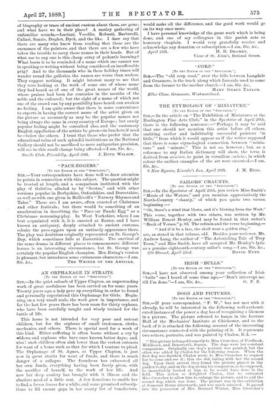" PACE-EGGERS."
[TO THE EDITOR OF THE "SPECTATOR."] SIR,—Your correspondents have done well to draw attention to points in connection with this subject. The question might be treated at length, and a comparison instituted with the play of Galatian alluded to by " Scotus," and with other versions popular in Derbyshire, Oxfordshire, and Dorsetshire, as well as with one given in Halliwell's " Nursery Rhymes and Tales." These are, I am aware, often enacted at Christmas and other festivals ; but there would be something of an anachronism in describing the " Pace (or Pasch) Egg " as a Christmas mumming-play. In West Yorkshire, where I am best acquainted with it, it is enacted at Easter, and I have known an antiquary, deeply attached to ancient customs, rebuke the pace-eggers upon an untimely appearance there. The play was doubtless originally represented on St. George's Day, which sometimes falls at Eastertide. The survival of the same drama in different places to commemorate different heroes is an interesting circumstance, but St. George was certainly the popular English champion. Mrs. Ewing's version is pleasant, but introduces some extraneous characters.—I am, Sir, &c., THE WRITER OF THE ARTICLE.


































 Previous page
Previous page